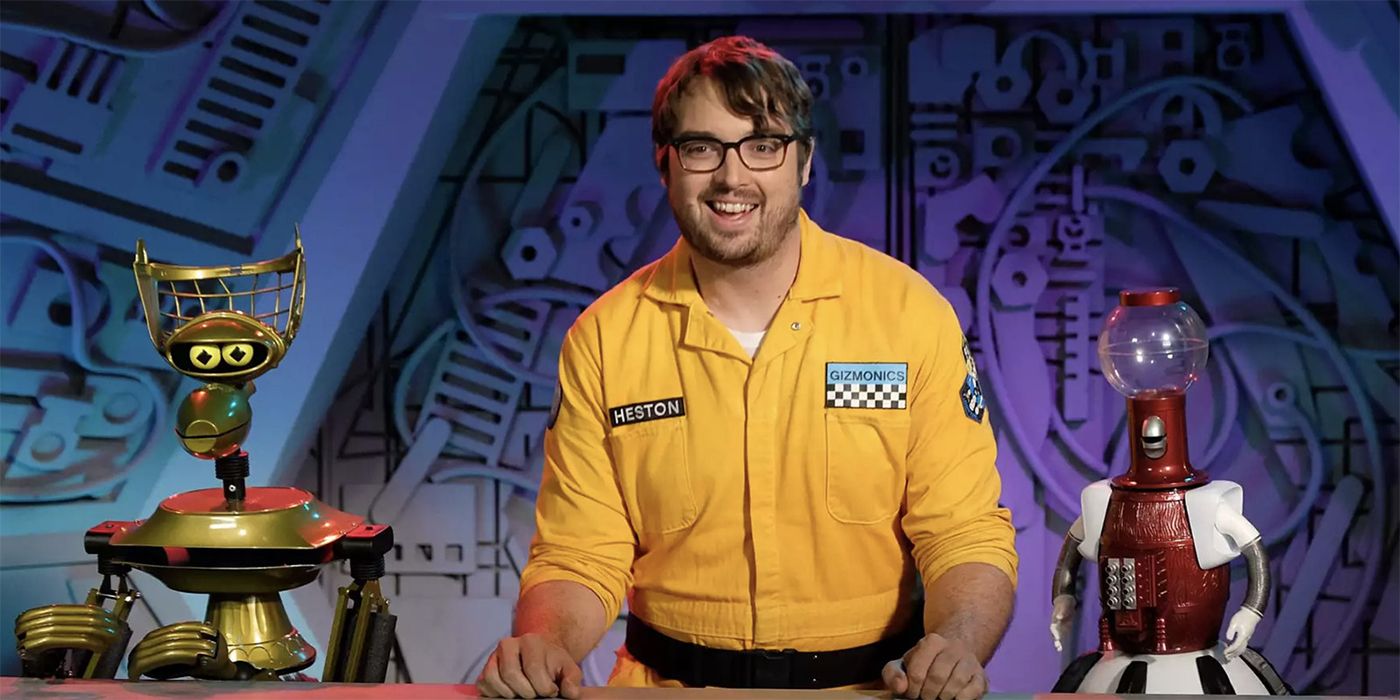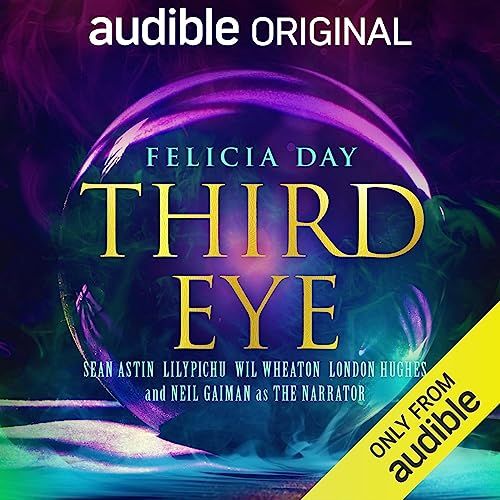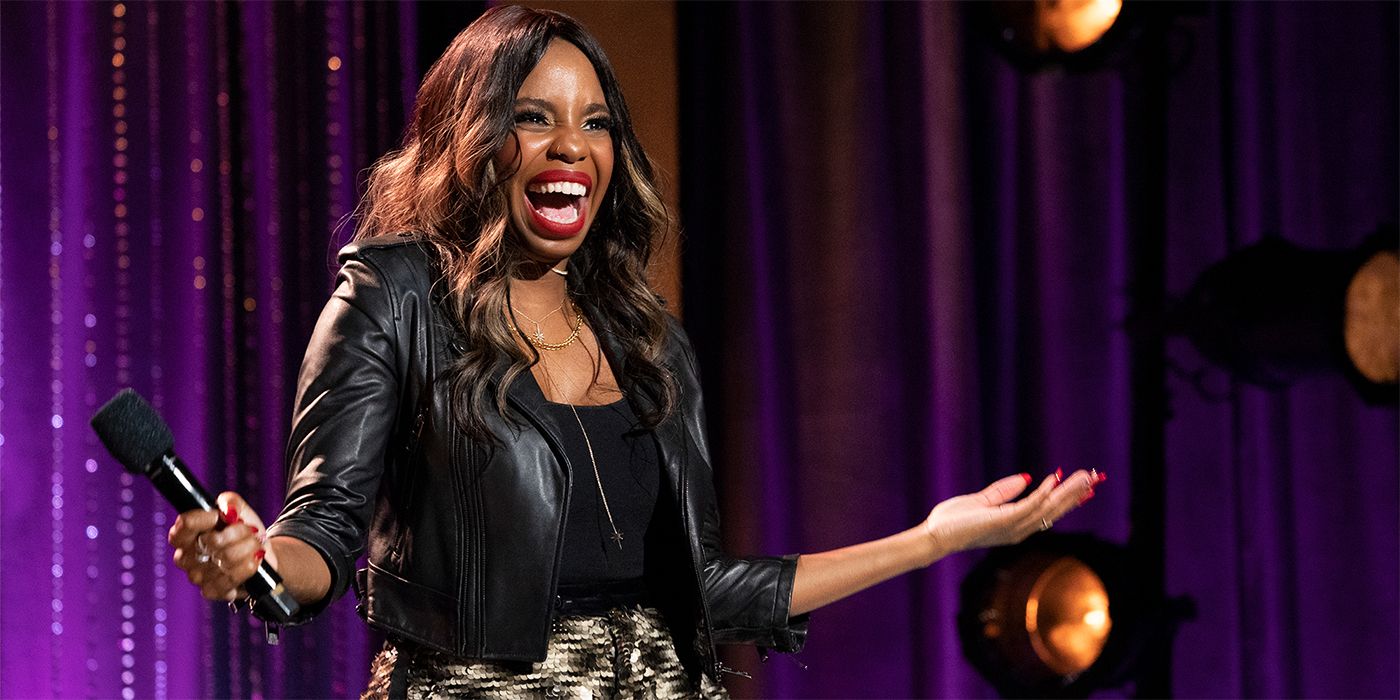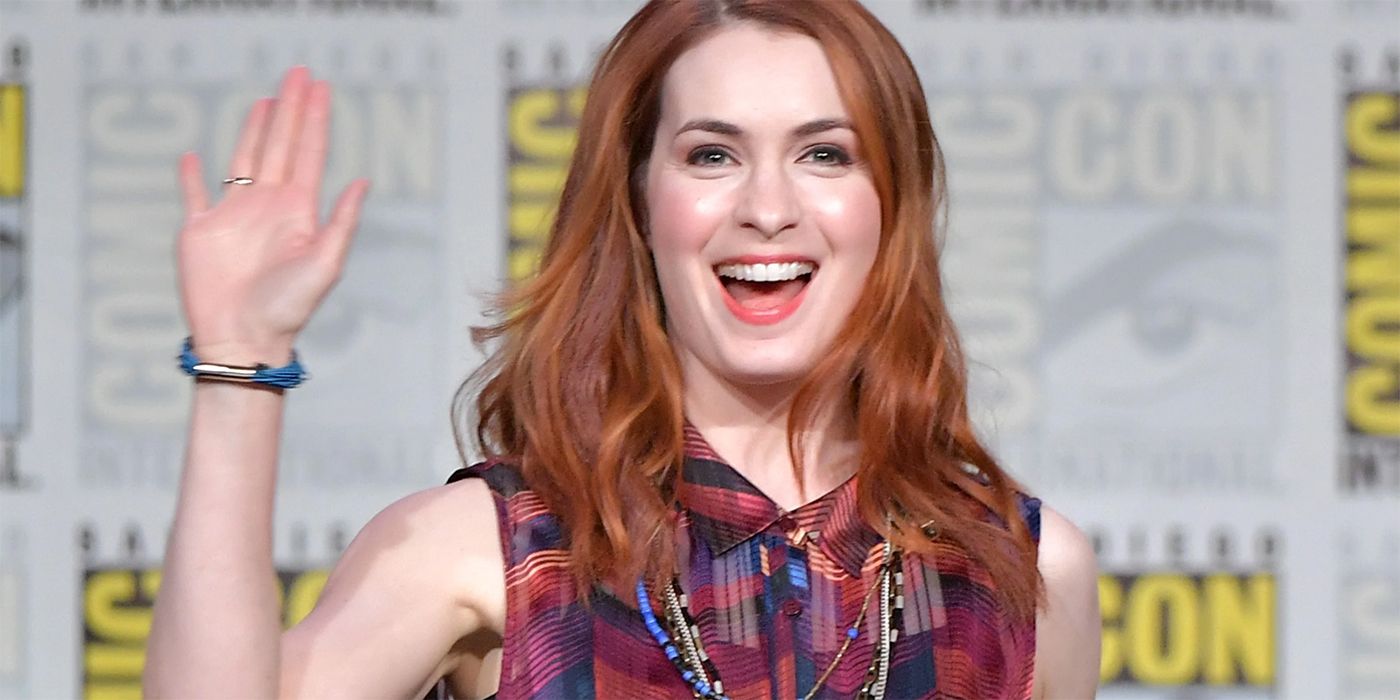Summary
- Third Eye is an Audible scripted audio fantasy comedy about a wizard named Laurel and her quest to defeat old enemy and uncover shocking secrets.
- The series features a star-studded cast, including Felicia Day, Sean Astin, Wil Wheaton, and Neil Gaiman as The Narrator.
- Third Eye combines fantasy and comedy, with a focus on creating real and relatable characters, and is set in a hidden supernatural world within our own.
Third Eye follows Laurel, a wizard and "Chosen One," as she struggles with the consequences of failing to defeat her enemy, Tybus, a decade earlier. Laurel must overcome her self-doubt and ruined reputation to save her friends and uncover shocking secrets as she prepares to confront her old enemies. While on her quest, Laurel meets a quirky teenager on her own quest, a curmudgeonly vampire, an enforcer for Tybus the Terrible, and an exiled Faerie princess.
The scripted audio fantasy comedy Third Eye is created by Felicia Day, who also stars in the series. Third Eye features a star-studded cast, including Sean Astin, LilyPichu, Wil Wheaton, London Hughes, Danny Pudi, Alan Tudyk, Hudson Yang, and Christopher Judge. Acclaimed author Nail Gaiman also lends his voice as The Narrator. Third Eye will debut on Audible on October 5.
Felicia Day, Jonah Ray, and London Hughes caught up with Screen Rant at San Diego Comic-Con to talk about their upcoming scripted audio series Third Eye. Day revealed that she has been working on this passion project for years and discusses collaborating with Gaiman while London shared what she brought from her experience in film and television into her voice acting for Third Eye. All three creatives also spoke out in support of the SAG-AFTRA and WGA strikes, as they are currently promoting under a separate contract.
Felicia Day, Jonah Ray & London Hughes On Third Eye
Screen Rant: London, I got to talk. We talked about this for just a brief second. This is your first San Diego Comic-Con ever.
London Hughes: I'm losing my Comic-Con virginity in style. It's a threesome. I'm loving it.
What were you most excited to explore about Comic-Con?
London Hughes: Do you know what? The whole people dressing up thing, that's not really something that we do in England. We're not really dress-up folks. I'm looking forward to the people dressing up, and I'm a bit of a secret nerd.
Felicia Day: You shouldn't have worn those shoes.
London Hughes: Why didn't you tell me? See what I mean?
Felicia Day: Listen, you're London. You're fabulous. I was like, “She's going to bring a note of fabulousness to Comic-Con that we don't have.” You are cosplaying cool people.
London Hughes: I'm cosplaying a rich lady who can't stand up.
Felicia, what inspired the story of Third Eye?
Felicia Day: Third Eye is my television show. It was the one that I wanted to star in. Unfortunately, that didn't happen for Hollywood. But fortunately, years later after I wrote the pilot, and I was able to work with Audible to bring this to life in a full television format. So, this is the TV show in audio format.
It's 10 episodes. It's many, many hours. You're going to be able to take in a whole season of what I conceived of, which was my favorite characters I've ever created. I play Laurel Pettigrew, a failed chosen one from a fantasy story. London plays Sybil Aurora Moonglow, who is the most obnoxious fairy princess you've ever met. She embodies it. And Jonah, who is a very good friend of mine from Mystery Science Theater 3000 and many other projects came in and voice-directed, and he's so fabulous. So, it really is cinematic. It's crazy world-building and very, very funny.
I love audio dramas. I will literally just drive in my car for hours upon hours just to get it done.
London Hughes: Oh, you will do that when you listen to this. It'll have you hooked.
Jonah, talk to me a little bit about the tone and genre of the series, because this mixes fantasy and comedy together.
Jonah Ray: Yeah, that's something I've always loved. I'm a huge Mel Brooks fan, so [I love] anytime you could do comedy and parody, but have it be more than a parody. We're not just making fun of these tropes. We are actually just making this fantasy story and then adding in jokes. And Felicia has always been really fantastic at that. Something I've always admired is her ability to have it be dramatic, but then also have it be funny.
That was probably my favorite aspect of directing it. At this point, “Do we need a joke? No, let's take that joke out. Let's make this feel serious because it's still a sweet moment.” And then it's like, “Let's add some jokes into this part instead.” That was always the best part.
London Hughes: I second that. You are so clever with the dramatic, then funny, then sweet, then funny. It's great.
Felicia Day: These characters are so real. And this is our first interview! I've worked on this for eight years; five years with Audible. This is our first interview. I'm so excited to just tell everybody about it. The characters are really important to me. They're not just sketch characters; it's comedy, but these are characters. Every single character has an arc, and you're going to go on a journey with them over the 10 episodes. I really want everyone to care about the characters and relationships in a way that you just want to live with them forever.
You've had these characters in your head forever. Can you talk to me about the casting process and how the cast brought this specific thing that you were looking forward to with the roles?
Felicia Day: I want to be honest with you, almost every single cast member is somebody I kind of wrote in my head, except for London.
London Hughes: I'm the wild card.
Felicia Day: She's the wild card, because I had an archetype in my head, and Jonah was like, "I know this girl who's...” and I saw 30 seconds of one of your standups. By the way, she's one of the funniest standups ever. Amazing. I was like, “My God, it's Sybil.” You came down on a cloud with those sexy ass legs. And she brought so much even more to it.
That's the wonderful thing. I wrote a part for Wil Wheaton, my friend Sean Astin plays Frank, another one of the leads, who is a very portly vampire. Another one of the characters who is kind of the catalyst for the show is a young girl named Kate, and she's played by LilyPichu. She is an incredible, huge popular streamer, but her passion is voiceover. Once I watched her one time on a stream, I was like, “She's my Kate.” Oh, and Neil Gaiman! Sorry, forgot to drop that name.
London Hughes: Neil Gaiman, by the way, narrates the whole thing. It's just a small little thing.
London, what are you most excited to tease about season 1?
London Hughes: Not much. [Laughs] It's not what you expect. You'll go in thinking one thing, then leave laughing and being totally addicted. It's going to be your new obsession. I'm excited for all the nerds that will be in my DMs when it drops because I'm just like Sybil in real life, and she is a wild one. I'm excited about all the new fans I'm going to get, honestly. It's going to be huge.
Felicia, can you break down this world of fantasy for us because it includes princesses, wizards, and vampires?
Felicia Day: Yeah, it does. When I pitched it as a TV show, a couple of the executives literally almost puked on the table when I mentioned that because they were so cool. Those guys are unemployed now. [Everyone laughs] All those executives don't have a job anymore. All these people who didn't buy this, you're going to regret it, although you're not in the business anymore.
Anyway, what I wanted was [to be] unfettered. I always like to create depth. I've created gamer characters in the past who were real people. They're not just cliches. And I took a bunch of tropes and I wanted to make them real in a very grounded way. This is a fantasy world that's in our world. What inspired this whole thing was driving past a cash-for-gold shop in Los Angeles, and I was like, “Who the hell has gold?” And when they do it, they melt it down.
That's the catalyst for the whole show: what if we had the supernatural world around us, and it's just hidden? And so just peeling that back, building it over many years to be a real visceral thing. I want people to listen to this and be like, "Hey, is that a dwarf shop? Or that person... Is that really maybe Baba Yaga?" Those are what I want people to really question and bring the life around us even more to life.
Felicia, can you talk to me about why you wanted to focus on the Chosen One story and past failures?
Felicia Day: I was a former prodigy. I was a violinist. At a very young age, I got a full scholarship to college. I was in the Austin Symphony, and I was kind of a prodigy in a way. I was a low-level prodigy.
London Hughes: No, don't humble yourself. She was a prodigy.
Felicia Day: I was kind of an overachiever. I realized that drove a lot of me. In therapy, I was like, "Oh, that prodigy syndrome is very destructive for further growth,” and you feel frozen in time. In several ways, I felt like a failure; like I didn't live up to my potential in some ways. I kind of carried that root into this because the Chosen One is such a popular trope. You're just anointed and really deconstructing that, so it's a really personal story for me. And I'm really excited for people to see that trajectory and understand that just because you've gotten this blessing doesn't mean it's a blessing. It can be a curse too.
What did you guys learn from doing an audio drama that you didn't expect through the process?
London Hughes: There's a lot more acting than I thought that there would be. I'm like, “Okay, we're in a booth. I'm talking. But there were times where I actually had to [act it out]. I'm actually eating and going “he, he, he.” If there was a video of me in the booth, I'm acting so much. I'm sweating. The sound effects are big.
Jonah Ray: I do remember that there was one time where I was like, "Oh, remember, you're running in the scene." You're like, "But I'm just standing here."
Felicia Day: That's what I love about Jonah. He is a director, and he's done a lot of on-camera stuff. And I really believe sometimes audio can feel a little stilted, and it can feel like people aren't in the room together. And for the most part, we actually got a lot of cast together, and we were acting in scenes. When we aren't, Jonah was there to really make it feel like we were acting with each other in a scene.
And all those extra efforts, they weren't in the script, but he was able to bring this life to it that felt like people are in a room together, and they're in a space together. I think that's something that I always miss in audio that I think we're really capturing.
London Hughes: We really did. I was fighting demons. I was fighting. I was there. I was really there.
Felicia Day: I was in a separate room. I had to get away from her.
Jonah Ray: Because you try to do it without the moves, and it doesn't sound right.
London Hughes: No. I'm very method, so I had to just channel my inner fairy. And that was deep for me. Really deep. I went on a journey.
How was that process, Jonah? What did you learn from this?
Jonah Ray: Just the idea of ways to fill up the space. Because when you're watching something, you need these new elements to stimulate the brain so people stay engaged and want to keep on paying attention. So in audio, what are the things you can do there? And sometimes it's intonation on the line delivery or the back and forth, or even just someone reacting inaudibly or that kind of. You have to find these things. [To Felicia] You're very good at that. Your stammers are one of the best in the biz.
Felicia Day: It's organic to me.
Jonah Ray: But on top of that, when we were doing the post stuff, I’m thinking of the sound effects. It's like, "Hey, let's make it so it sounds like this person is pacing back and forth in the room." So, you hear footsteps in the audio.
Felicia Day: And that was the process when Audible came. When I got this production schedule, I'm like, “Why do we have six months for post?” We've been working on the episodes for six months, and I think I underestimated them. I know sound, and even a little tiny sound can make a joke work where it didn't work. On-camera editing is so important, and that kind of attention to detail, especially with the magical fights is amazing.
I know how hard it is to craft that for the screen, but I can only imagine how much harder that is to do that in audio format.
London Hughes: Actually, we actually work harder than [onscreen] actors in Hollywood because we have to imagine it for you and bring it to life for your ears.
Felicia Day: Yeah, we want you to be visualizing when you're listening.
Jonah Ray: We didn't want to have those moments where it's like someone has to say it out loud. It's like, "Wow, a portal is opening up." You want to just hear it so you understand that there is some kind of thing happening. And even just something as simple as how the door to this place should be a swinging door, and the door from this side should be a heated curtain. Stuff like that.
London, I love your energy. What did you want to bring to your role that wasn't on the page?
London Hughes: I didn't need to bring anything. It's just me. When Jonah said to me, "I want you to do this," and I read it, I was like, “This is just me.” It doesn't even feel like I need to work. I didn’t need to think, “Well, where was my journey? What was I going through?” No, it's me.
Felicia Day: Every joke, it was just adding things. “Can you do this?” But then she would add something in the end. Honestly, I laugh more with her. I did get a note early on in the TV writing process that Sybil is way more interesting than Laurel, and I had to take it down. But I just basically put it all back in.
You mentioned earlier that Neil Gaiman is the narrator. Talk to me about working with him and collaborating with him.
Felicia Day: Neil is just an otherworldly specimen. He's like a deity coming to life. No, he's wonderful. I could not believe it; I was trembling when I sent the email. I was like, "Would you consider…? But it's okay if you don't do it." And he read it, and he's like, "I'm doing this only because I think it's excellent.
And he did a lot of improv. It's a narrator part, and he's an actor. This is not book narration. He's acting, and he embodies this. And as you listen to the episodes, he kind of gets snarkier. He added all of that for the performance. It was very amazing.
Jonah Ray: And it was collaborative too. We would give him, "Oh, try it like this." Stuff that wasn't on the page and he wasn't better than it or anything. I remember one time I gave him a note, I was like, "Oh, say this." And he was like, "Oh yeah, that's very funny." And then I felt so good. I was just like, “Oh, man.” For another thing, I was like, "Oh, try to say it like this." And he goes, "No, that's not funny." Then he thought about it some more and was like, "That's not funny at all." And I got right back to baseline.
Off subject for a second here, Comic-Con is obviously affected by the SAG-AFTRA and WGA strikes, and we at Screen Rant are firm supporters of SAG and WGA. Can you educate our audience and let them know how you want to see the industry changed?
Felicia Day: I am not an official spokesperson for SAG. We are definitely here under a different contract, but we are 100% supporters of the strike. There's a lot of upheaval in our industry, and people are not making a living. There's a lot of exploitation, and the wealth disparity is increasing, and we just want to be able to get the fair deal that we had in other deals. All I can say is that if you look down the line, everything is justified and reasonable, and it's time to dig in.
London Hughes: My thing is I'm a member of WGA and SAG, so I'm double striking. [We] all are double striking. And the reality is just this simple: there'll be no entertainment industry without entertainment. And the reality is we're not the ones making all the money. The people that don't know how to make entertainment, that are not talented, that are not writing, that are not acting? They're the ones making all the money. And that's what's confusing to me. I just think it needs to be a level playing field, and the entertainment industry should go back to the entertainers.
Jonah Ray: Yeah, exactly. And across the board too, with all labor like IATSE and Teamsters. Everybody that's there, everyone that's doing those terrible turnarounds – it has to just be better working conditions across the board.
Felicia Day: There's a reason why there's unionization across the country in all sectors. It's because it needs to happen.
London Hughes: And it's not just in America. It's in the UK too. The UK is watching, because we're going for it as well.
Abut Third Eye
Laurel (Day), a “Chosen One” wizard still grappling with the fallout of failing a decade earlier in her fight with the ultimate evil Tybus (Judge). Our heroine is forced to overcome her tattered reputation and self-loathing in order to save her friends, eventually uncovering shocking secrets on the way toward confronting old enemies. Along the way, Laurel encounters characters including Kate Chen (LilyPichu), a quirky, teenage human girl on a quest for knowledge about the supernatural world; Frank Fletcher (Astin), a cranky, stubborn vampire; Robigus (Wheaton), the local San Francisco enforcer for Tybus the Terrible and a constant thorn in the side for Laurel; and Sybil (London Hughes), an exiled Faerie princess in her 20s who exemplifies “hot mess.”
Third Eye will premiere on Audible on October 5, and the first episode is available for free now.




